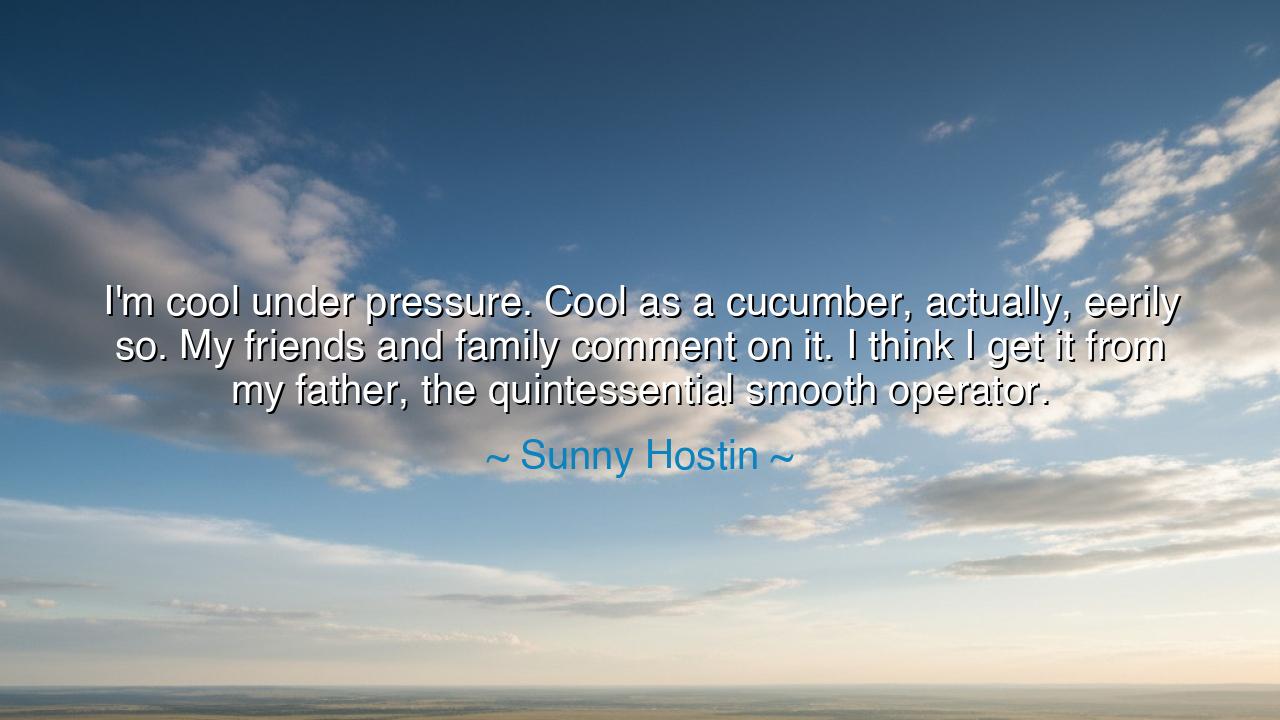
I'm cool under pressure. Cool as a cucumber, actually, eerily so.
I'm cool under pressure. Cool as a cucumber, actually, eerily so. My friends and family comment on it. I think I get it from my father, the quintessential smooth operator.






The eloquent Sunny Hostin, known for her intellect, grace, and poise, once said: “I’m cool under pressure. Cool as a cucumber, actually, eerily so. My friends and family comment on it. I think I get it from my father, the quintessential smooth operator.” Beneath these lighthearted words lies a truth that reaches beyond personality — a lesson in composure, discipline, and the quiet strength of inner calm. It is a truth that the ancients would have revered: that the one who masters herself in chaos possesses a power greater than the conqueror of nations.
To be cool under pressure is not to be emotionless, but to hold one’s center when storms arise. It is the mark of those who have trained their spirits to remain still amidst turmoil, like a lake that mirrors the sky even as winds rage above it. Sunny Hostin speaks of her father, that “smooth operator,” not as one untouched by difficulty, but as one who has learned to move with life rather than against it — to meet crisis with calm, to answer fire not with fire, but with water. Such composure is not inherited merely by blood, but by example — it is a discipline passed down through quiet observation, the child learning from the parent how to face the world without fear.
The origin of her reflection comes from a deep and timeless lineage of thought. Across civilizations, the greatest minds have spoken of the power of calmness under strain. The Stoic philosopher Seneca wrote, “No man is more unhappy than he who never faces adversity. For he is not permitted to prove himself.” Likewise, the samurai of Japan practiced mushin — the “mind without disturbance” — the ability to remain tranquil even in the face of death. Hostin’s modern words echo these ancient teachings: the strength that endures is not loud, not frantic, but steady, measured, and aware.
There is an old story of Marcus Aurelius, emperor of Rome, whose reign was burdened with war and plague. Once, when his generals quarreled and his people despaired, he was found sitting calmly in the midst of chaos, writing in his journal. When asked how he could remain so serene while the empire trembled, he replied, “You have power over your mind — not outside events. Realize this, and you will find strength.” This is the essence of Hostin’s “cool as a cucumber” — not the denial of emotion, but mastery of it; not the absence of fear, but the ability to act wisely in spite of it.
When Hostin says her calm “comes from her father,” she speaks to another eternal truth — that composure is a legacy. Children learn not only through the words of their parents, but through their demeanor in adversity. A parent who remains centered in hardship teaches courage far better than one who merely speaks of it. Her father’s smoothness, his ability to walk through tension with grace, is a quiet inheritance — one that shapes her character more deeply than wealth or fame. The ancients would have called this virtus — the noble strength that passes through generations like a flame, unchanged by the winds of time.
To remain cool under pressure is not a gift of temperament alone; it is a practice. It requires presence — the art of seeing the moment clearly, without being swept away by panic or ego. In our modern age, where noise, urgency, and reaction dominate, this quality is rarer than gold. Yet it is the key to wisdom, leadership, and peace. The leader who panics loses his followers; the friend who rages loses her influence. But the one who stays calm, who speaks when others shout, and who waits when others rush — that one becomes a beacon.
The lesson, therefore, is profound and practical: cultivate composure. Learn to pause before reacting. In moments of anger, breathe before speaking. When the world seems to spin, anchor yourself in stillness. This is not weakness — it is mastery. For calmness under pressure is not passivity; it is controlled energy, directed purpose. It is the art of the warrior, the wisdom of the sage, and the elegance of the “smooth operator.”
So let Sunny Hostin’s words echo through the corridors of time: “I’m cool under pressure… cool as a cucumber.” Do not mistake serenity for softness — for the water that flows smoothly can carve through stone. Be like that water: composed, focused, and unyielding in purpose. And when storms rise around you — as they surely will — remember that your peace is not the absence of the storm, but the eye within it. In that stillness, you will find both power and freedom — the calm inheritance of those who have learned to master themselves.






AAdministratorAdministrator
Welcome, honored guests. Please leave a comment, we will respond soon